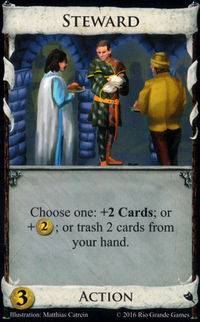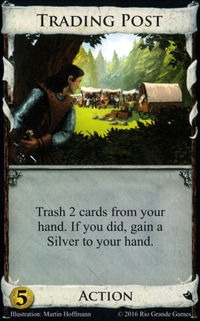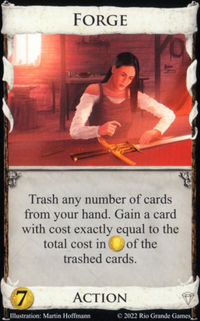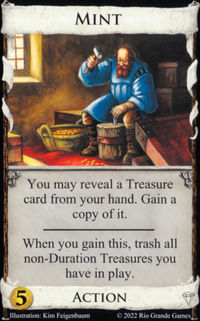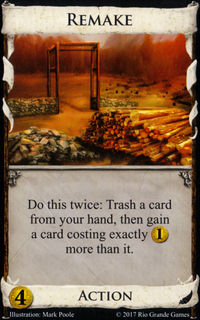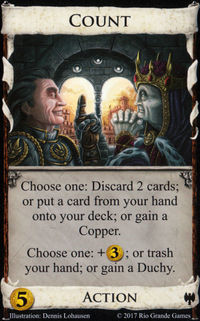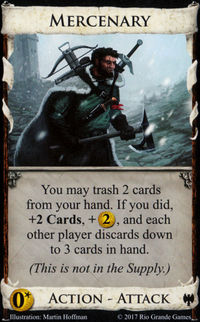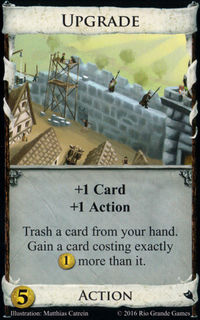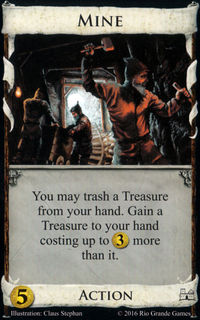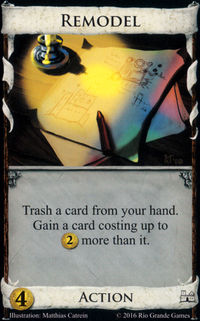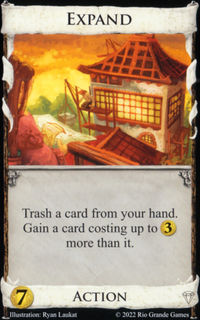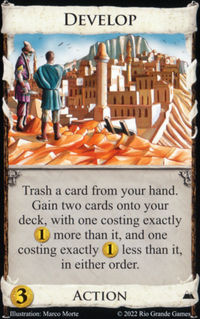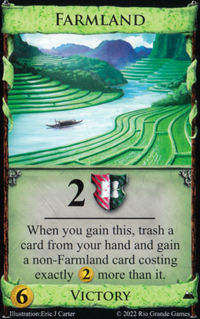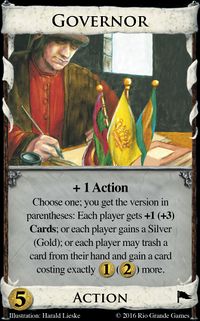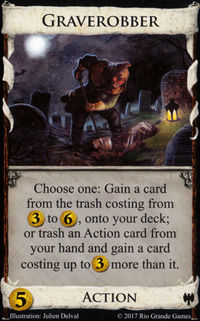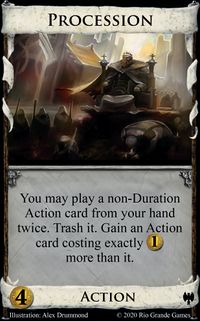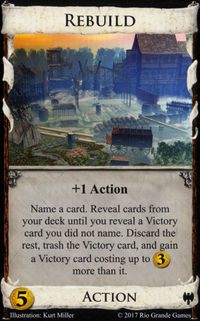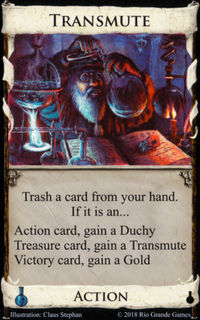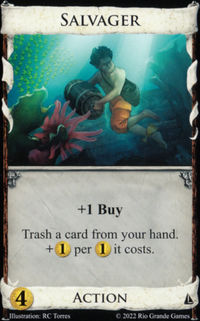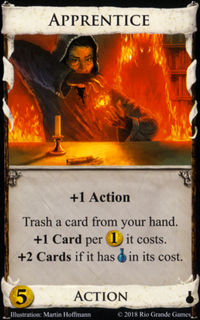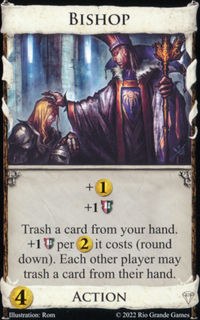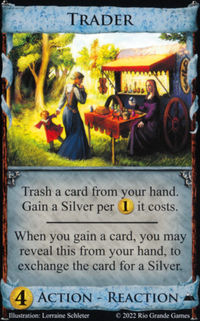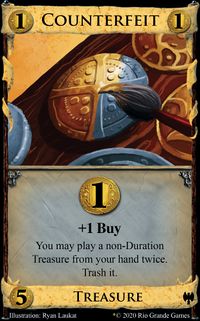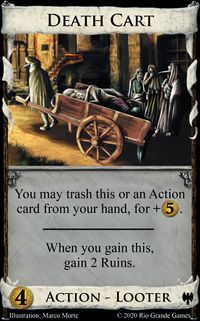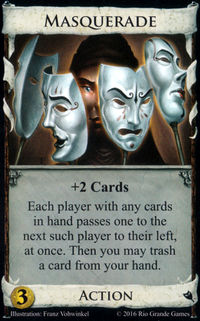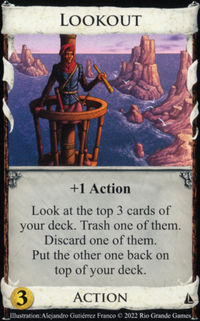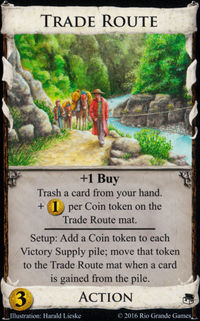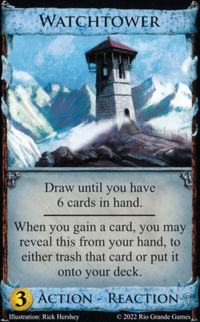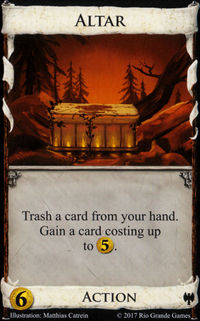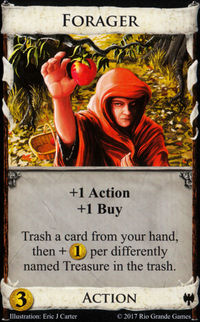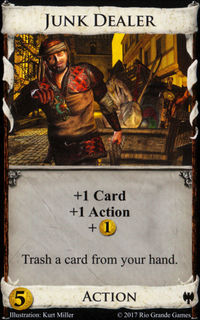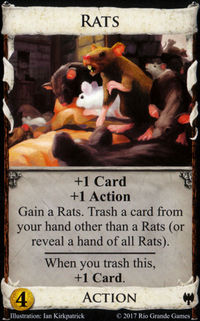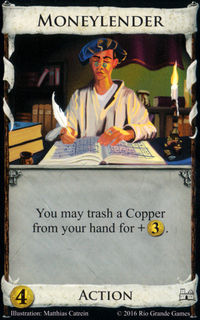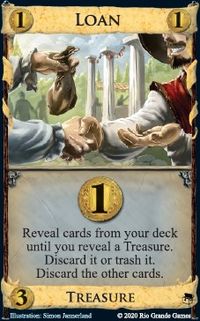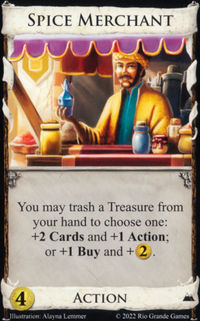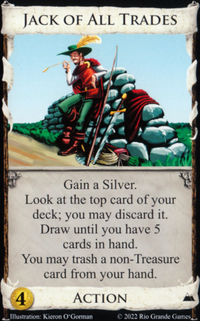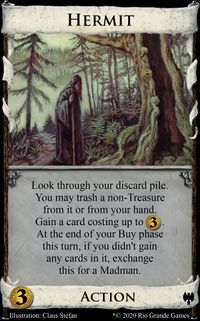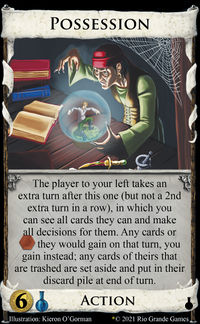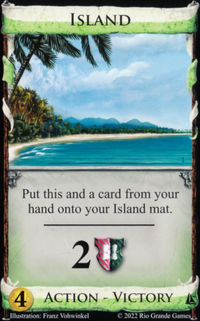Trasher
(→Other trash-for-benefit cards) |
m (Replaced Card Links with template for fancy links) |
||
| Line 1: | Line 1: | ||
'''Trasher''' is the generic term for any card with the ability to [[trash]] one or more cards from your hand or deck. (Cards which trash another player's cards are considered [[trashing attack]]s, while cards that trash themselves are referred to as [[one-shot]]s). | '''Trasher''' is the generic term for any card with the ability to [[trash]] one or more cards from your hand or deck. (Cards which trash another player's cards are considered [[trashing attack]]s, while cards that trash themselves are referred to as [[one-shot]]s). | ||
| − | There are two main uses for trashers. The first is simply to eliminate weak cards from the deck ("deck-thinning"), in order to enable faster [[cycling]] and have more concentrated hands of useful cards—this chiefly involves trashing starting cards ( | + | There are two main uses for trashers. The first is simply to eliminate weak cards from the deck ("deck-thinning"), in order to enable faster [[cycling]] and have more concentrated hands of useful cards—this chiefly involves trashing starting cards ({{Card|Copper}}s and {{Card|Estate}}s or [[Shelter]]s) and {{Card|Curse}}s, but can also apply to cards that were purchased for early-game use and have outlived their usefulness, such as [[curser]]s after the Curse pile is depleted. |
The second is to receive some benefit from the act of trashing itself—either by trashing a card that has an on-trash effect, or because the trasher itself has a useful effect in addition to trashing. Trashers in this last category are often referred to under the umbrella term "[[trash for benefit]]", though sometimes (as below) the term specifically refers to trashers that give better benefits for trashing more powerful cards. | The second is to receive some benefit from the act of trashing itself—either by trashing a card that has an on-trash effect, or because the trasher itself has a useful effect in addition to trashing. Trashers in this last category are often referred to under the umbrella term "[[trash for benefit]]", though sometimes (as below) the term specifically refers to trashers that give better benefits for trashing more powerful cards. | ||
| Line 9: | Line 9: | ||
==Multi-card trashers== | ==Multi-card trashers== | ||
| − | These cards allow rapid deck-thinning. | + | These cards allow rapid deck-thinning. {{Card|Chapel}} is the multi-card trasher ''par excellence'' due to the combination of its cheap price and the large number of cards it lets you trash; other multi-card trashers usually offer benefits in addition to trashing, or alternative effects that keep the card relevant after you've trashed all the cards you want to trash. |
| − | *[[Dominion]]: | + | *[[Dominion]]: {{Card|Chapel}} |
| − | *[[Intrigue]]: | + | *[[Intrigue]]: {{Card|Steward}}, {{Card|Trading Post}} |
| − | *[[Prosperity]]: | + | *[[Prosperity]]: {{Card|Forge}} |
| − | ** | + | ** {{Card|Mint}} has an on-buy trashing effect. |
| − | *[[Cornucopia]]: | + | *[[Cornucopia]]: {{Card|Remake}} |
| − | *[[Dark Ages]]: | + | *[[Dark Ages]]: {{Card|Count}}, [[Dame Anna]], {{Card|Mercenary}} |
==Trash for benefit== | ==Trash for benefit== | ||
| Line 24: | Line 24: | ||
===Remodelers=== | ===Remodelers=== | ||
| − | These are cards that allow you to trash one or more cards and gain cards to replace them depending on the cost of the trashed card. Some provide other benefits in addition to the gain. These cards usually ''improve'' your deck by trashing weaker cards for stronger cards, without substantially ''thinning'' your deck, because you gain in addition to trashing. Some remodelers, however, allow you to trash more cards than you gain ( | + | These are cards that allow you to trash one or more cards and gain cards to replace them depending on the cost of the trashed card. Some provide other benefits in addition to the gain. These cards usually ''improve'' your deck by trashing weaker cards for stronger cards, without substantially ''thinning'' your deck, because you gain in addition to trashing. Some remodelers, however, allow you to trash more cards than you gain ({{Card|Forge}}), or require you to gain cards of a ''specific'' cost, allowing you to thin your deck if there are no available cards at that cost ({{Card|Upgrade}} and {{Card|Remake}} are the best examples of this). Some are restricted to trashing cards of specific [[type]]s. |
Many remodelers have names that are verbs. | Many remodelers have names that are verbs. | ||
| − | *Dominion: | + | *Dominion: {{Card|Mine}}, {{Card|Remodel}} |
| − | *Intrigue: | + | *Intrigue: {{Card|Upgrade}} |
| − | *Prosperity: | + | *Prosperity: {{Card|Expand}}, {{Card|Forge}} |
| − | *Cornucopia: | + | *Cornucopia: {{Card|Remake}} |
| − | *[[Hinterlands]]: | + | *[[Hinterlands]]: {{Card|Develop}} |
| − | ** | + | ** {{Card|Farmland}} has an on-buy remodeling effect. |
| − | *[[Promo]]: | + | *[[Promo]]: {{Card|Governor}} |
| − | *Dark Ages: | + | *Dark Ages: {{Card|Graverobber}}, {{Card|Procession}}, {{Card|Rebuild}} |
| − | *[[Alchemy]]: | + | *[[Alchemy]]: {{Card|Transmute}} gains a card depending on the ''type'' of the trashed card, rather than its cost. |
===Other trash-for-benefit cards=== | ===Other trash-for-benefit cards=== | ||
| Line 43: | Line 43: | ||
These cards provide benefits scaled to the cost of the trashed card, ''other'' than gaining cards whose cost depends on that of the trashed card: | These cards provide benefits scaled to the cost of the trashed card, ''other'' than gaining cards whose cost depends on that of the trashed card: | ||
| − | *[[Seaside]]: | + | *[[Seaside]]: {{Card|Salvager}} |
| − | *Alchemy: | + | *Alchemy: {{Card|Apprentice}} |
| − | *Prosperity: | + | *Prosperity: {{Card|Bishop}} |
| − | *Hinterlands: | + | *Hinterlands: {{Card|Trader}} |
| − | *Dark Ages: | + | *Dark Ages: {{Card|Counterfeit}} provides a benefit scaled to the ''value'' of the trashed Treasure, rather than its cost. |
==Single-card trashers== | ==Single-card trashers== | ||
| − | These trashers have effects that are independent of the properties of the cards being trashed, and can trash any card. These have a variety of uses: many are deck thinners or improvers; but for | + | These trashers have effects that are independent of the properties of the cards being trashed, and can trash any card. These have a variety of uses: many are deck thinners or improvers; but for {{Card|Death Cart}}, for example, the trashing is in part a penalty, to compensate for the strong +{{coin|5}} effect. |
| − | *Intrigue: | + | *Intrigue: {{Card|Masquerade}} |
| − | *Seaside: | + | *Seaside: {{Card|Lookout}} |
| − | *Prosperity: | + | *Prosperity: {{Card|Trade Route}} |
| − | ** | + | ** {{Card|Watchtower}} is not usually considered a trasher, since it can only trash cards when you gain them. This is useful as a defense against unwanted incoming cards and as a way of activating cards' on-trash effects instantaneously, however. |
| − | *Dark Ages: | + | *Dark Ages: {{Card|Altar}}, {{Card|Death Cart}}, {{Card|Forager}}, {{Card|Junk Dealer}}, {{Card|Rats}} |
**Altar and Rats resemble Remodelers in that they trash one card and gain one card, but what card can be gained is not dependent on what card is trashed. | **Altar and Rats resemble Remodelers in that they trash one card and gain one card, but what card can be gained is not dependent on what card is trashed. | ||
===Copper trashers=== | ===Copper trashers=== | ||
| − | These cards are primarily used for trashing | + | These cards are primarily used for trashing {{Card|Copper}}: {{Card|Moneylender}} can ''only'' trash Copper, while the others can trash other [[Treasure]] cards as well, but do not provide better benefits for trashing more useful Treasures. |
| − | *Dominion: | + | *Dominion: {{Card|Moneylender}} |
| − | *Prosperity: | + | *Prosperity: {{Card|Loan}} |
| − | ** | + | ** {{Card|Mint}}'s on-buy effect, while not a single-card trasher, is also best used for trashing Copper. |
| − | *Hinterlands: | + | *Hinterlands: {{Card|Spice Merchant}} |
===Estate trashers=== | ===Estate trashers=== | ||
| − | These cards can't trash [[Treasure]] cards and don't give better benefits for trashing better cards. Therefore in the early game they're most likely to be used for trashing | + | These cards can't trash [[Treasure]] cards and don't give better benefits for trashing better cards. Therefore in the early game they're most likely to be used for trashing {{Card|Estate}}s or [[Shelter]]s specifically; later in the game, they may be used on {{Card|Curse}}s, obsolete early-game [[Action]] purchases, and cards with on-trash benefits. |
| − | *Hinterlands: | + | *Hinterlands: {{Card|Jack of all Trades}} |
| − | *Dark Ages: | + | *Dark Ages: {{Card|Hermit}} |
==Pseudo-trashers== | ==Pseudo-trashers== | ||
| − | These cards offer ways of removing cards from your deck other than trashing them. This can sometimes allow sneaky combos with | + | These cards offer ways of removing cards from your deck other than trashing them. This can sometimes allow sneaky combos with {{Card|Possession}}. |
| − | *Intrigue: | + | *Intrigue: {{Card|Masquerade}} |
** Masquerade ''both'' allows you to pseudo-trash a card by passing it away ''and'' allows you to actually trash another card. | ** Masquerade ''both'' allows you to pseudo-trash a card by passing it away ''and'' allows you to actually trash another card. | ||
| − | *Seaside: | + | *Seaside: {{Card|Ambassador}}, {{Card|Island}} |
Revision as of 05:59, 6 November 2012
Trasher is the generic term for any card with the ability to trash one or more cards from your hand or deck. (Cards which trash another player's cards are considered trashing attacks, while cards that trash themselves are referred to as one-shots).
There are two main uses for trashers. The first is simply to eliminate weak cards from the deck ("deck-thinning"), in order to enable faster cycling and have more concentrated hands of useful cards—this chiefly involves trashing starting cards (Coppers and Estates or Shelters) and Curses, but can also apply to cards that were purchased for early-game use and have outlived their usefulness, such as cursers after the Curse pile is depleted.
The second is to receive some benefit from the act of trashing itself—either by trashing a card that has an on-trash effect, or because the trasher itself has a useful effect in addition to trashing. Trashers in this last category are often referred to under the umbrella term "trash for benefit", though sometimes (as below) the term specifically refers to trashers that give better benefits for trashing more powerful cards.
Contents |
Types of trashers
Multi-card trashers
These cards allow rapid deck-thinning. Chapel is the multi-card trasher par excellence due to the combination of its cheap price and the large number of cards it lets you trash; other multi-card trashers usually offer benefits in addition to trashing, or alternative effects that keep the card relevant after you've trashed all the cards you want to trash.
- Dominion: Chapel
- Intrigue: Steward, Trading Post
- Prosperity: Forge
- Mint has an on-buy trashing effect.
- Cornucopia: Remake
- Dark Ages: Count, Dame Anna, Mercenary
Trash for benefit
Several cards allow you to trash a card and receive a bonus or benefit that depends on the cost (or occasionally other properties) of the trashed card(s). These are commonly referred to as trash-for-benefit (or "TfB") cards. (Most trashers give you some benefit to your current turn other than trashing, and the term "trash-for-benefit" is sometimes used more broadly to refer to all such cards.)
Remodelers
These are cards that allow you to trash one or more cards and gain cards to replace them depending on the cost of the trashed card. Some provide other benefits in addition to the gain. These cards usually improve your deck by trashing weaker cards for stronger cards, without substantially thinning your deck, because you gain in addition to trashing. Some remodelers, however, allow you to trash more cards than you gain (Forge), or require you to gain cards of a specific cost, allowing you to thin your deck if there are no available cards at that cost (Upgrade and Remake are the best examples of this). Some are restricted to trashing cards of specific types.
Many remodelers have names that are verbs.
- Dominion: Mine, Remodel
- Intrigue: Upgrade
- Prosperity: Expand, Forge
- Cornucopia: Remake
- Hinterlands: Develop
- Farmland has an on-buy remodeling effect.
- Promo: Governor
- Dark Ages: Graverobber, Procession, Rebuild
Other trash-for-benefit cards
These cards provide benefits scaled to the cost of the trashed card, other than gaining cards whose cost depends on that of the trashed card:
- Seaside: Salvager
- Alchemy: Apprentice
- Prosperity: Bishop
- Hinterlands: Trader
- Dark Ages: Counterfeit provides a benefit scaled to the value of the trashed Treasure, rather than its cost.
Single-card trashers
These trashers have effects that are independent of the properties of the cards being trashed, and can trash any card. These have a variety of uses: many are deck thinners or improvers; but for Death Cart, for example, the trashing is in part a penalty, to compensate for the strong + effect.
- Intrigue: Masquerade
- Seaside: Lookout
- Prosperity: Trade Route
- Watchtower is not usually considered a trasher, since it can only trash cards when you gain them. This is useful as a defense against unwanted incoming cards and as a way of activating cards' on-trash effects instantaneously, however.
- Dark Ages: Altar, Death Cart, Forager, Junk Dealer, Rats
- Altar and Rats resemble Remodelers in that they trash one card and gain one card, but what card can be gained is not dependent on what card is trashed.
Copper trashers
These cards are primarily used for trashing Copper: Moneylender can only trash Copper, while the others can trash other Treasure cards as well, but do not provide better benefits for trashing more useful Treasures.
- Dominion: Moneylender
- Prosperity: Loan
- Mint's on-buy effect, while not a single-card trasher, is also best used for trashing Copper.
- Hinterlands: Spice Merchant
Estate trashers
These cards can't trash Treasure cards and don't give better benefits for trashing better cards. Therefore in the early game they're most likely to be used for trashing Estates or Shelters specifically; later in the game, they may be used on Curses, obsolete early-game Action purchases, and cards with on-trash benefits.
- Hinterlands: Jack of all Trades
- Dark Ages: Hermit
Pseudo-trashers
These cards offer ways of removing cards from your deck other than trashing them. This can sometimes allow sneaky combos with Possession.
- Intrigue: Masquerade
- Masquerade both allows you to pseudo-trash a card by passing it away and allows you to actually trash another card.
- Seaside: Ambassador, Island




